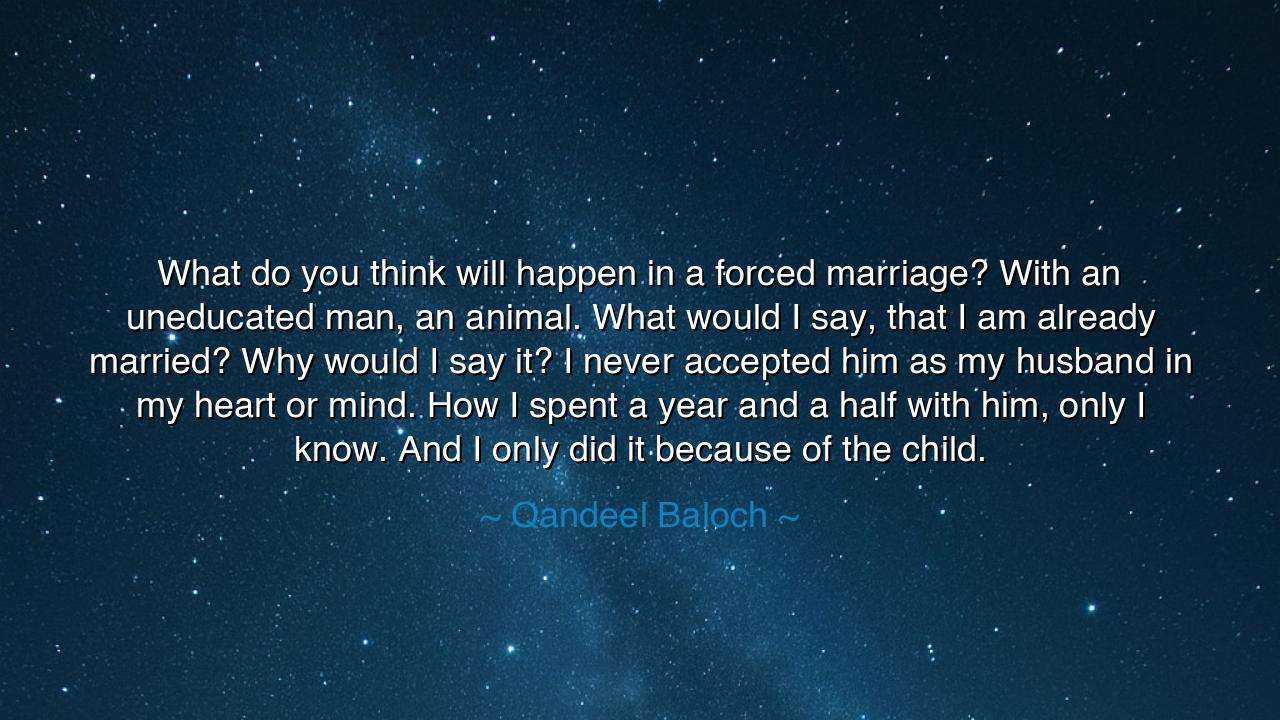
What do you think will happen in a forced marriage? With an
What do you think will happen in a forced marriage? With an uneducated man, an animal. What would I say, that I am already married? Why would I say it? I never accepted him as my husband in my heart or mind. How I spent a year and a half with him, only I know. And I only did it because of the child.






In the raw and trembling words of Qandeel Baloch, we hear the cry of a woman who dared to speak truth in a world that sought to silence her: “What do you think will happen in a forced marriage? With an uneducated man, an animal. What would I say, that I am already married? Why would I say it? I never accepted him as my husband in my heart or mind. How I spent a year and a half with him, only I know. And I only did it because of the child.” These words are not merely an echo of personal pain; they are a testament of rebellion—a declaration against the chains that have bound women for centuries in the name of honor, custom, and obedience. They come from the depths of suffering, yet shine with the light of defiance, for in them lives the spirit of one who would not be broken.
The origin of this quote lies in the tragic and turbulent life of Qandeel Baloch, a Pakistani model, activist, and social media star whose boldness made her both a symbol of female empowerment and a target of moral outrage. Born into poverty and forced into marriage at a young age, she fled from abuse, carrying within her not shame, but the fierce conviction that her life was her own. In speaking these words, she revealed the torment of that forced marriage, describing a bond that was never chosen and a man who treated her as property rather than partner. Yet her voice carried more than personal grief—it carried the anguish of countless women silenced under the weight of tradition.
At its heart, Qandeel’s lament is a cry for autonomy, for the sacred right of every soul to choose love freely. She exposes the hypocrisy of societies that claim to honor marriage as holy while allowing it to become a prison of coercion. To her, marriage without consent is not union but violation—a desecration of both love and dignity. Her question, “What do you think will happen in a forced marriage?” is not only rhetorical; it is prophetic. It speaks of the violence that occurs when a woman’s will is crushed beneath the authority of family and faith. It warns that when love is commanded by force, it ceases to be love—it becomes suffering sanctified by silence.
History bears witness to this suffering. Consider the story of Razia Sultana, the first and only female ruler of Delhi in the 13th century. Though she was crowned by merit, not marriage, her reign was constantly undermined by men who could not bear her independence. They plotted her downfall and forced alliances upon her in the name of propriety and control. Like Qandeel, Razia defied them, riding into battle clad in armor, a queen refusing to bow to convention. Both women, centuries apart, reveal the same eternal truth: that a woman’s freedom is her crown, and when it is stolen, her spirit must rise to reclaim it, even at the cost of her life.
Qandeel’s words also uncover the emotional violence of forced obedience—the torment of living beside one who does not see you as equal, but as possession. “I never accepted him as my husband in my heart or mind,” she said, and in that refusal lies the essence of her resistance. Though bound in body, her spirit remained free. Though she lived under oppression, she refused to grant her oppressor legitimacy. This is the quiet heroism of her defiance: she would rather be condemned by the world than betray the truth of her own soul. Hers was the rebellion of the heart—a rebellion that frightens tyrants, for it cannot be subdued by law or violence.
Her tragic death—murdered in an “honor killing” by her own brother—revealed the cost of such defiance in societies that mistake control for morality. Yet even in death, her words continue to burn with power. They are the voice of every woman forced into submission, every daughter denied choice, every wife trapped in the illusion of sanctity without love. Through her truth, she became immortal—not as a celebrity, but as a martyr for freedom and consent. She reminds us that the worth of a marriage lies not in its recognition by society, but in its acceptance by the heart.
Let this teaching, then, be spoken to all generations: no bond is sacred if born of coercion, and no law of man can sanctify the breaking of a soul. Marriage, when pure, is a covenant of respect, not dominion; a union of equals, not captor and captive. Those who force love destroy it. Those who silence choice betray the very God they claim to serve. To honor Qandeel’s legacy is to fight for a world where every woman’s “yes” and “no” carry equal power, where education replaces ignorance, and compassion triumphs over control.
And thus, in the brave and heartbreaking words of Qandeel Baloch, we find not merely confession, but commandment: that love must be free, that marriage must be chosen, and that the human heart must never be enslaved. Her story is both wound and warning—a reminder that the fight for dignity begins where silence ends. Let us, therefore, speak as she did: without fear, without apology, and without surrender. For in that voice—the voice that refuses to yield—lies the birth of every revolution worth fighting for.






AAdministratorAdministrator
Welcome, honored guests. Please leave a comment, we will respond soon